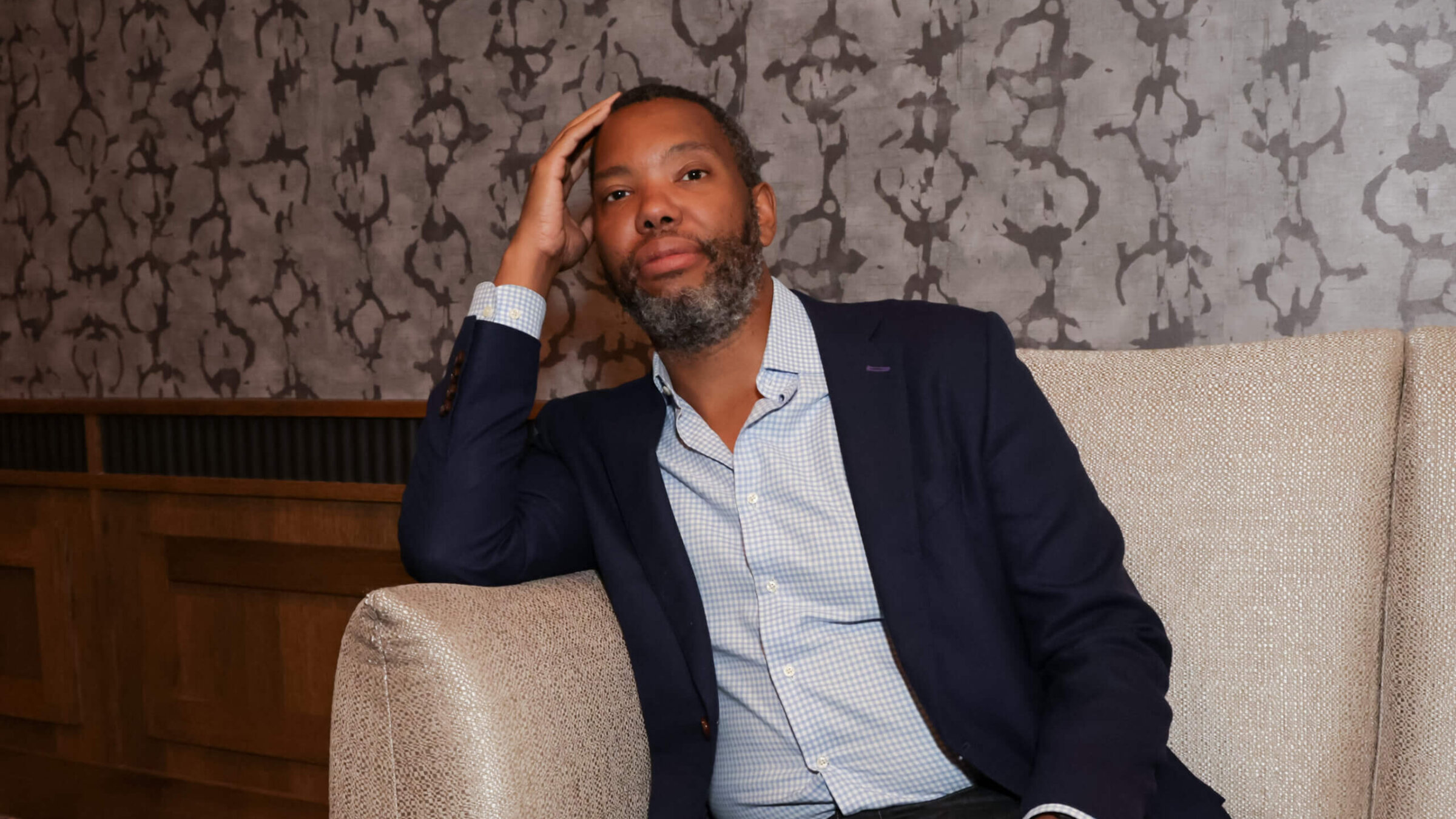I’m a Jew of color. Ta-Nehisi Coates can’t apply US lessons to Israel.
The history of conquest and oppression in the Holy Land is infinitely more complicated than it is in the US

Ta-Nehisi Coates. Photo by Carol Lee Rose/Getty Images for Decolonizing Wealth Project
I grew up in the U.S. as a mixed-race kid — Israeli Jewish father, Caribbean Jewish mother. For me, reading the book that made Ta-Nehisi Coates truly famous — Between the World and Me — was therapeutic. I resonated deeply with his anguished letter to his son in an attempt to prepare him for the dangers of life as an American Black man. It made me remember the pained look on my own father’s face as he once looked at his melanated son sitting in the back of a police car, for the “crime” of “being brown” in the wrong place at the wrong time.
The amount of not just respect, but personal connection, I feel to Coates’ previous work makes his new misfire on the subject of the Israeli-Palestinian conflict that much more painful to consider. The longest essay in his recently published book, titled The Message, attempts to inspire a thoughtful discourse on injustice in the Holy Land. But he misses the mark by trying to draw a direct analogy between the historical experiences of Black Americans and those of Palestinian Arabs — a bias he acknowledges when he recalls in his youth arriving at the conclusion that “the Israelis were ‘white,’ and the Palestinians were ‘Black.’”
My white-presenting father did not know what it meant to belong to a conquered people in the United States. But he did come from a conquered people in Palestine: the Palestinian Jewish community known internally as the “Old Yishuv.”
For nearly two millennia in the land now known as Israel, Jews and Samaritans endured second-class citizenship, regular abuse and occasional massacres under imperial rule.
While white Christians were engaged in acts of genocide and ethnic cleansing in their expanding colonies — like the British colonies that predated the creation of the U.S. – Arab Muslims were conquering, colonizing and marginalizing Jews and Samaritans in the land now known as Israel; Copts and Nubians in Egypt; and Assyrians and Mandeans in Iraq; replacing them with Arabic-speaking Islamic majorities.
What this means: Coates’ American model — in which a non-native group conquered and oppressed native peoples of color, as well as enslaved persons of color — cannot be accurately applied to Israel. Jews and Arabs alike have long called the land of Israel home; the history of conquest and oppression there is infinitely more complicated than in North America.
My great-grandfather was born in Jerusalem in the final years of the Ottoman Caliphate. His life was scarred by the dehumanization to which he was subjected simply for the crime of being a Jew in Judea; arbitrary arrests, being forced to dismount his donkey when he passed a Muslim, constant verbal and physical harassment with the looming threat of death if he stepped out of line.
It was this humiliation that inspired him, and the vast majority of native-born Palestinian Jews, to embrace Jewish refugees and their dream of national liberation — Zionism.
The ongoing conflict between Jews and Arabs, Israelis and Palestinians, over our shared homeland is nothing short of a tragedy. A tragedy expressed in daily injustices suffered by Palestinian Arabs living under military rule in the occupied West Bank, and the regular violence unleashed by the Islamic Republic of Iran and its many proxies surrounding Israel on Israeli Jews and Arabs alike. (Don’t forget: The one person killed in Iran’s most recent attack was a Palestinian man in the West Bank.)
Israelis and Palestinians have deep grievances that animate this painful reality — a reality of which Coates scratches only the surface.
Coates, like many American thought leaders on race relations before him, went to Israel with the a priori assumption that Israel is essentially the U.S. in the Middle East. His essay is filled with descriptions that impose an American framework on what he saw during a 10-day trip to the region: of Israeli police donning “shades like Georgia sheriffs,” and of the “reservations of Gaza, or the ghettos of Lydd.”
It’s hard to blame him. American politicians, for the better part of Israel’s existence, have based their allyship with Israel on the notion that Israelis are basically Hebrew-speaking Americans, with plenty of Israeli politicians giving lip service to this notion.
It’s true that both the United States and Israel are (flawed) liberal democracies that enshrine and ensure freedom of speech and religion, and have free and fair elections. But, of course, those aren’t the parts of the American experience that Coates sees reflected in Israel. Rather, it’s the fact that America was founded as a settler-colonial state by Europeans.
The trouble is that for anyone who has spent a substantial amount of time in Israel or studying the history of the Middle East, the notion that Israel is either colonial or European is farcical.
The Middle East isn’t just the geographic location of the Jewish state; it’s a core part of its culture and identity. A majority of Israeli Jews’ recent ancestors lived in and were driven out of Arab and Muslim majority countries before coming to Israel as refugees. Their cultural and political identity, which plays a determining role in Israeli policy, is informed by their experiences as an ethno-religious minority under Arab rule.
For Coates, the presence of Black and brown Jews in Israel is an odd complication to the binary through which he sees us. He dismisses the possibility of us having uniquely Jewish experiences and identity, tersely describing the majority of Israeli Jews as “Black and Arab Jews whose stories could have been staged in Atlanta instead of Tel Aviv.”
In order to strengthen the U.S.-Israel analogy, you have to emphasize — as Coates does — the Europeanness of Israel’s founders, and their relationship with the British Empire. To do so, you must de-emphasize the fact that these same founders were refugees from the scourge of a white supremacist racism that for centuries in Europe emphasized their Middle Eastern origins. (Other non-Arab Middle Eastern minorities also utilized a relationship with the British to further their ambitions for national liberation — see the “Assyrian Levies,” who fought for the British against Nazi-allied forces in Iraq, after being promised a national homeland.)
So, far from being a mirror image of the U.S., the Jewish presence and pursuit of self-determination in their people’s ancestral lands — in the context of a competing Palestinian Arab national claim — is unique and complex. When Coates insists on analyzing it in the language of an American paradigm, he disqualifies himself from offering truly useful insight on a deeply painful situation.
This isn’t just a rhetorical or philosophical problem. Coates’ words, sadly, play right into the hands of dictators with imperial ambitions in the region today. The Islamic Republic of Iran has spent untold billions imposing its intolerant and brutal vision on the Middle East, bankrolling entities in Palestinian, Lebanese, Syrian, Iraqi, and Yemeni society that share a vision of a Middle East ethnically cleansed of Jews — and in which the oppression of sexual, ethnic and religious minorities is normative.
None of this context appears in Coates’ essay. The legacy of Arab antisemitism and extremism — including Hamas’ crimes on Oct. 7 — are not mentioned. But examples of Jewish bigotry and extremism abound.
I share Coates’ empathy for Palestinians and their struggle. A sober analysis of the injustices they face daily could help motivate us to create a future where both Israelis and Palestinians might experience liberation.
Instead, his words, rather than advancing the cause of collective liberation, perpetuate the marginalization of non-Arab and non-Muslim minorities all over the Middle East.
In the most vulnerable moment of the essay, Coates admits that “there was a time when I wrote about this history from afar, invoking it in service of what I perceived to be a more important story.” I am afraid that, rather than an atonement, his newest work is precisely in line with this approach — an outsider’s gaze on a situation he understands substantially less well than he believes.
Perhaps nothing illustrates this better than the story of a Yazidi woman, Fawzia Sido, who was recently liberated by the IDF in Gaza after being enslaved by ISIS in Iraq in 2014 and sold to Palestinian Islamists when she was just 11 years old.
The same supremacist ideology that enslaved Sido led to the murder of almost 1,200 people on Oct. 7, 2023, and the launch of nearly 200 ballistic missiles at Israel just before Rosh Hashanah. It made generations of my conquered ancestors second-class citizens in their homeland.
It’s Sido’s story, my great-grandfather’s story, and the stories of marginalized and persecuted ethnic and religious minorities throughout the Middle East that Coates’ Message has erased and exploited for what he has determined to be “a more important story”; the story that situates American race relations and politics as the center of every story. Which only serves to obfuscate the reasons for the Israeli-Palestinian conflict — and complicate the efforts to resolve it.






















